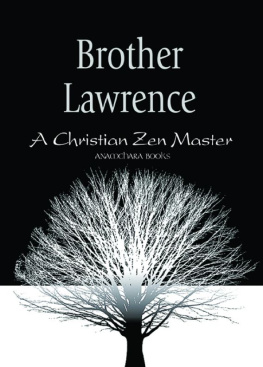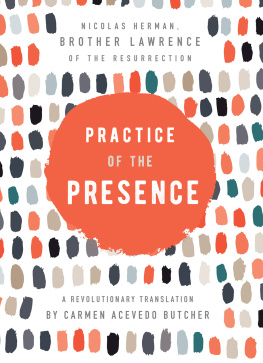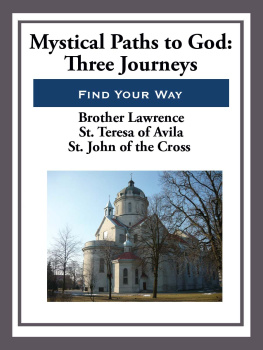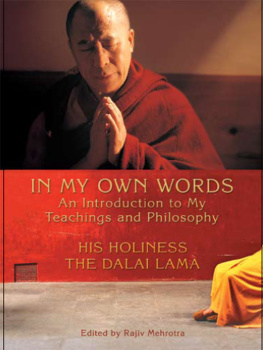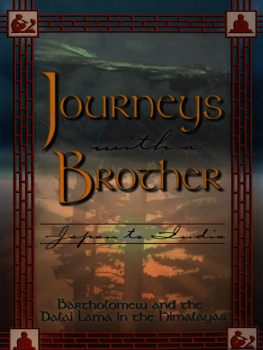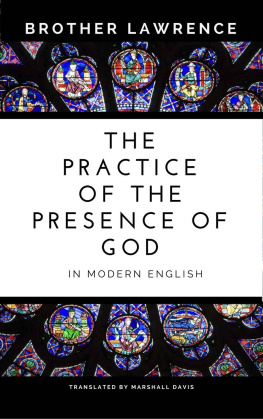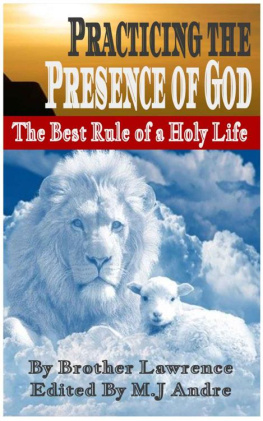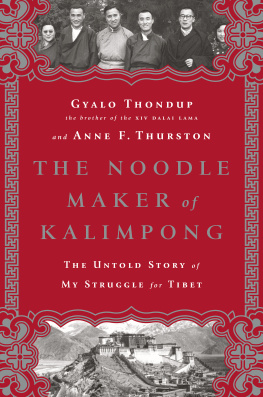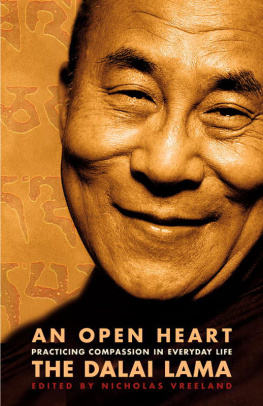Anamchara Books - Brother Lawrence: A Christian Zen Master
Here you can read online Anamchara Books - Brother Lawrence: A Christian Zen Master full text of the book (entire story) in english for free. Download pdf and epub, get meaning, cover and reviews about this ebook. year: 2011, publisher: Anamchara Books, genre: Religion. Description of the work, (preface) as well as reviews are available. Best literature library LitArk.com created for fans of good reading and offers a wide selection of genres:
Romance novel
Science fiction
Adventure
Detective
Science
History
Home and family
Prose
Art
Politics
Computer
Non-fiction
Religion
Business
Children
Humor
Choose a favorite category and find really read worthwhile books. Enjoy immersion in the world of imagination, feel the emotions of the characters or learn something new for yourself, make an fascinating discovery.
- Book:Brother Lawrence: A Christian Zen Master
- Author:
- Publisher:Anamchara Books
- Genre:
- Year:2011
- Rating:4 / 5
- Favourites:Add to favourites
- Your mark:
- 80
- 1
- 2
- 3
- 4
- 5
Brother Lawrence: A Christian Zen Master: summary, description and annotation
We offer to read an annotation, description, summary or preface (depends on what the author of the book "Brother Lawrence: A Christian Zen Master" wrote himself). If you haven't found the necessary information about the book — write in the comments, we will try to find it.
Brother Lawrences famous work, The Practice of the Presence of God, is broken into bite-size pieces and paired with the writings of some of the greatest Zen teachers, from the Buddha to the Dalai Lama. The result sheds new light on this great Christian classic, offering profoundly practical insights for the spiritual life.
Brother Lawrence: A Christian Zen Master — read online for free the complete book (whole text) full work
Below is the text of the book, divided by pages. System saving the place of the last page read, allows you to conveniently read the book "Brother Lawrence: A Christian Zen Master" online for free, without having to search again every time where you left off. Put a bookmark, and you can go to the page where you finished reading at any time.
Font size:
Interval:
Bookmark:
Brother Lawrence A Christian Zen Master Anamchara Books *** 978-1-933630-12-0 Published by Anamchara Books atSmashwords Copyright 2011 by Anamchara Books, aDivision of Harding House Publishing Service, Inc. All rightsreserved. No part of this publication may be reproduced ortransmitted in any form or by any means, electronic or mechanical,including photocopying, recording, taping, or any informationstorage and retrieval system, without permission from thepublisher. *** Contents *** Brother Lawrence was a Carmelite monk born inFrance in the early years of the seventeenth century. He was nogreat intellectual, and he left behind neither a detailed biographynor any great theological treatise. In fact, we know only a handfulof personal facts about the man: he felt guilty for failures henever described; he considered himself to be clumsy and awkward;and for all his ordinariness and humility, something about his lifeattracted the attention of others.
He began life as Nicholas Herman, anordinary young man whose poverty drove him to join the army, wherehe received his meals and a small stipend. He soon had to leave thearmy, however, because of an injury (one that may have left himwith a limp for the rest of his life). Eventually, he entered theCarmelite monastery in Paris as Brother Lawrence of theResurrection. There he complied with his superiorsinstructions regarding prayer time; he read the spiritual books hewas told to read. Neither activity brought him as great anawareness of God as had the stark branches of a tree in winter thathad brought about his conversion. The world of the intellect hadlittle interest for him, and he was not much concerned withtheology or doctrine.
Brother Lawrence worked in the monasteryskitchen, however, and there, in the midst of the most ordinary andmenial responsibilities, he developed an unusual and practicalability to focus himself on the presence of God. His simpleawareness of the Divine Presence changed him. He was no longeroverwhelmed with shame and self-loathing. Instead, he lived a lifeof such serenity and joy that others wanted to know his secret. Heeven attracted the attention of a cardinal. The cardinal sent his envoy, the Abbe deBeaufort, to interview Brother Lawrence.
Afterward, the abbe wrotea terse summary of Brother Lawrences responses to his questions.This record, a few notes referred to as maxims, and a handful ofletters were all Brother Lawrence left behind when he died at theage of eighty. These sparse paragraphswere put together and became The Practiceof the Presence of God , a smallinspirational book that would continue to be read over the nextthree hundred years. Today, in the twenty-first century, itcontinues to challenge readers to understand the spiritual life ina new way. More than eleven centuries before BrotherLawrence, another monk named Bodhidharma had developed a way oflife that was not so different from that practiced by the Carmelitemonk. Bodhidharma, however, was a Buddhist monk from India. Hetraveled through Southeast Asia and into China, bringing with himhis teachings, creating a new understanding of Buddhism.
His teachings were, according to latersacred writings, a special transmission outside the scriptures,not founded upon words and letters, by pointing directly to themind. He taught that by focusing on the interior being, a personcould wake up to the truth and light. Today, he is credited withbeing the father of Zen Buddhism. The word Zen comes from a Sanskrit wordthat has to do with quieting or focusing the mind. It is theexperience of being able to see truly, so that you no longermistake your own identity with the world of circumstances, while atthe same time you are more truly present in each moment, ratherthan living somewhere else, in either the past or the future. Zenitself is not a religion but a technique, a practice that can beapplied to any religious tradition.
However, it grew out ofBuddhism, and it has always fit most comfortably within theBuddhist faith. As a religion, Buddhism encompasses a widerange of traditions, beliefs, and practices, all based on theteachings of Siddhartha Gautama, who lived and taught in Indiasomewhere between the sixth and fourth centuries bce. He is knowntoday as the Buddha, the awakened one. A simplistic understandingof Buddhism equates Buddha with God, but Buddha made no claim to bedivine. In fact, according to Buddhist scriptures,when one of his students asked him if he were the messiah, heanswered, No. No. No.
Then are you a teacher? No, I am not a teacher. Then what areyou? By this time the student was exasperated. I am awake,Buddha replied. This state of being awake, of beingenlightenedtotally present in the lightis the goal ofBuddhism. So what does this have to do with aseventeenth-century Christian monk? At its heart, Brother Lawrences practicewas simply Zena focus on the present moment in order to wake up,to be able to see the Light. This way of living drew not only theattention of church leaders during his day; down through thecenturies, it has continued to draw the attention of those who seein Brother Lawrences life a way of relating to God thatChristianity has often neglected.
Other mystics, including MeisterEckhart and Teresa of Avila, might be able to explain this ingreater detail in their writing; Brother Lawrence simply livedit. Not all Christians have welcomed thisperspective. Over the years, many have condemned Brother Lawrencefor a dangerous lack of doctrine, for focusing on simply beingrather than understanding and obeying the Bible. (Interestingly,many traditional Buddhists looked at Zen with the same fear andsuspicion.) Christianity and Buddhism may find itdifficult to communicate because they use very differentvocabularies, separate lexicons for talking about the meaning ofReality. Their words seem mutually exclusive. How can we say that aperson like Brother Lawrence, passionately in love with JesusChrist, has anything to do with the cool, almost bloodless serenityof Zen? As Christians, however, we may simply beconfused by Zens unfamiliar terminology.
Zen asks us to let go ofour focus on the ego, to empty ourselves of our selfishattachments, to destroy our mental constructs, and simply bepresent to the light. Not so very different from Christs call todie to ourselves so that we may be born again! According to BrotherDavid Steindl-Rast, Christians need to think Nothing when theycall God Love. Buddhists need to think Love when they sayEmptiness. This will at least wake us up to the fact that wordsmust always fall short of the ineffable. In this book, you will findmodern-language paraphrases from ThePractice of the Presence of God , pairedwith writings from many different Buddhist teachers, divided intosections based on common themes. These couplings are not meant todemonstrate a one-to-one correspondence, nor are they intended toprove that Zen Buddhism and Christianity (or at least BrotherLawrences version of it) are one and the same.
They are not. Butone can shine light on the other. We have all had the experience of seeing afamiliar face in an unfamiliar setting, so that we are taken bysurprise, startled out of our familiarity. For an instant, we maynot even recognize the person we thought we knew so welland whenwe do, we see that person in a new way, with a fresh awareness. AsChristians, a similar thing can happen when we look at our ownfaith from a different direction. The experience can beuncomfortable, but it can shake us free of what we think we knowand confront us with a deeper truth.
Ultimately, it can bring aricher life to our faith. According to a Zen teaching, if you meet theBuddha on the road, you should kill him. This seemingly brutal andnonsensical statement reminds us to beware of trying to confine ourfaith within tidy mental boxes. When we do so, we create falsegods. We cling to the image, the face we take for granted we knowso well, and we miss the reality. Brother Lawrence shows us a new face forChristianity.
Next pageFont size:
Interval:
Bookmark:
Similar books «Brother Lawrence: A Christian Zen Master»
Look at similar books to Brother Lawrence: A Christian Zen Master. We have selected literature similar in name and meaning in the hope of providing readers with more options to find new, interesting, not yet read works.
Discussion, reviews of the book Brother Lawrence: A Christian Zen Master and just readers' own opinions. Leave your comments, write what you think about the work, its meaning or the main characters. Specify what exactly you liked and what you didn't like, and why you think so.

